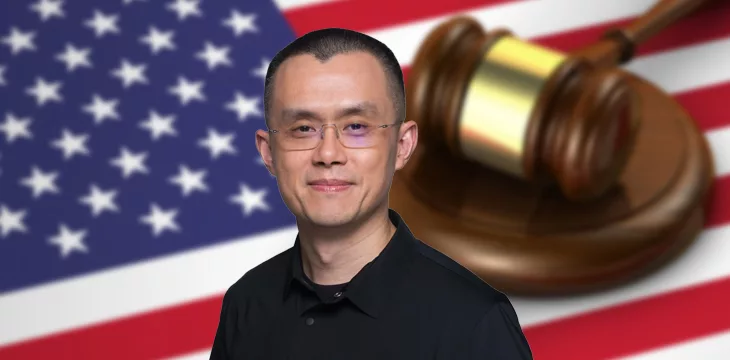|
Getting your Trinity Audio player ready...
|
Binance founder Changpeng ‘CZ’ Zhao may have spoiled his chance to be released on bail by implying that he expects to serve no time in jail for his egregious violations of U.S. banking laws.
Last week, CZ and Binance reached $4.3 billion plea agreements with prosecutors based on years of disdain for regulatory compliance, including habitual violations of the Bank Secrecy Act. Over the American Thanksgiving holiday, CZ’s attorneys filed their opposition
to federal prosecutors’ challenge of CZ’s bail conditions. Prosecutors oppose CZ being allowed to return to his residence in Dubai until next February, when his sentence will be pronounced in a Washington State federal court.
Prosecutors claim CZ is a major flight risk because he has no ties to the U.S. that would guarantee his return. He also has vast wealth outside the U.S. that could prove difficult to seize and which dwarfs the $15 million in cash he is putting up to secure his release. CZ also has a family in Dubai, with which the U.S. has no formal extradition treaty.
CZ’s attorneys countered these arguments by claiming that it is “well-established that foreign citizenship does not equate to flight risk and cannot be held against a defendant in assessing such a risk.” They further argue that CZ’s expected 18-month prison sentence—although he theoretically faces up to 10 years in stripes—doesn’t incentivize him to flee his judicial reckoning, particularly given the much harsher penalties that would kick in should he do a runner.
The audio recording of CZ entering his plea in a Seattle court last Tuesday shows him expressing contrition for his life of crime and his desire to “close this issue; otherwise, I wouldn’t be here today.” To bolster this claim, CZ assured Magistrate Judge Brian Tsuchida that he “will return” in February to learn his fate.
CZ’s attorneys argue that prosecutors’ concerns over CZ being a flight risk were “already considered and rejected” by Tsuchida during that Tuesday hearing. They further argue that CZ has no criminal record, and thus, he “may be eligible” to serve at least part of his prison sentence in “home detention or community confinement.”
But they also suggest CZ may qualify for “a below-guidelines sentence, including the possibility of no jail time.” Effectively, CZ is quietly urging the court to let him off with his $4.3 billion fine and a probationary term.
It’s a defense lawyer’s job to shoot for the moon in terms of obtaining the most lenient outcome possible for their client. But it’s unclear how CZ avoiding jail will sit with the general public should they learn more about Binance rolling out the welcome mat for the vilest of criminals, including those producing and distributing child sex abuse materials, as well as Islamic terror groups, who are very much in the headlines these days.
CZ warned that sentencing will consider ‘what happened’
Prosecutors aren’t arguing for CZ to stay behind bars until he’s sentenced, instead proposing that he remain in the continental U.S. subject to travel restrictions. If he stays in the U.S., “there are certain ways” to ensure he appears for his sentencing.
One of the arguments made by prosecutors during Tuesday’s hearing was that CZ has become a UAE citizen, and there is no record of the UAE government handing over one of its citizens to the U.S. for criminal prosecution. CZ’s attorneys countered that it was the UAE that offered citizenship to CZ; it wasn’t something CZ sought as a get-out-of-extradition-free card.
Prosecutors rejected this argument, saying the extraordinary preferential treatment the UAE has shown CZ is all the more reason to think they’d be unwilling to ship his ass to the U.S. In other words, it enhances the risk of CZ’s flight.
When CZ’s attorneys pointed out that their client had voluntarily showed up for the hearing, prosecutors said there was a “qualitative difference” between CZ coming to plead guilty and coming to hear his sentence, which would involve “a period of incarceration.”
In other words, if CZ’s ties to his family in Dubai are so great that he can’t bear to spend the next three months away from them, how hard will it be for him to leave them when he’s looking at spending 18 months in prison?
Judge Tsuchida warned CZ that the sentencing judge—U.S. District Court Judge Richard Jones—is under no obligation to accept recommendations for flexibility in the sentencing guidelines. The judge will also consider what exactly happened to convince the government to bring the charges against CZ and Binance.
On that last point, Tsuchida clarified: “And when I mean ‘what happened,’ not just the specific offense for which you are pleading guilty, but the entire picture. Because this kind of activity typically will involve not just one discreet tiny thing. It has context, right? … The judge will also consider specifically what your role was, how central were you, did you have a leadership role, [were] your actions more egregious, less egregious, something aggravating?”
In the end, Tsuchida told CZ it was a “very close call,” but he was inclined to “favor your position, to stay in the UAE … I think that your actions maybe speak louder than the worries in the sense that you had no obligation to come to the country and you did. And as you said, your intent is you would like to resolve this case, not run. And so, I think we will allow you to live in UAE. You will reside at a residence that you will maintain and let your lawyers know, and don’t change until you let your lawyers know.”
The empire strikes back
On Friday, the Department of Justice (DOJ) filed its response to CZ’s motion, reiterating many of the arguments it made at Tuesday’s hearing. But the DOJ also echoed the caveats that Tsuchida gave CZ re his sentencing by Judge Jones, stating that the government “is free to argue for any sentence up to the statutory maximum of ten years.”
As such, the government argues that “the penalties [CZ] faces at sentencing will no doubt seem significant to him, and that weighs in favor of the reasonable restrictions the United States proposes.” Prosecutors added that Pretrial Services recommended that CZ be detained until his sentencing date.
Prosecutors also poked holes in defense claims that courts have traditionally avoided using a person’s foreign citizenship against them when it comes to determining flight risk. Citing a Ninth Circuit Court of Appeals ruling from 1985, prosecutors say it is “clear the defendant’s citizenship ‘may be taken into account’ in the analysis of bond and detention.”
Judge Jones will consider the matter of CZ’s pre-sentencing freedom in a hearing scheduled for Monday. Jones could either issue his decision on the spot or rule that the matter requires further investigation and/or deliberation, so watch this space.
Binance’s finances
Meanwhile, Richard Teng, CZ’s replacement as Binance’s CEO, has been working hard to assuage fears that the $4.3 billion settlement poses a threat to customer funds. But assets continue to flow out of the exchange, with withdrawals topping $1.7 billion over the past week.
Those outflows are occurring despite Binance customers finding themselves unable to make withdrawals using their Binance Cards. Those problems appear to have begun on November 17, which we now know was three days after the DoJ filed its sealed indictment against CZ/Binance. The problem remains unresolved, with Binance Customer Support still issuing the same “we are working to resolve this” message to customers a week later.
Binance suffered a string of fiat on-/off-ramp divorces this year as traditional finance companies around the globe sought to distance themselves from Binance’s increasingly toxic public reputation. That situation isn’t likely to improve as more confirmation of Binance’s shenanigans emerge.
It hasn’t gone unnoticed that the DoJ settlement didn’t compel Binance/CZ to pay the entire $4.3 billion in one go. (In 2014, the DoJ gave French bank BNP Paribas just 30 days to pay a $8.8 billion penalty.) Instead, around $900 million must be paid within 30 days of the settlement, another $1.6 billion within six months, and the remaining $1.8 billion within 15 months.
Initially, Binance bros were quick to make light of the size of the financial penalty, calling it a pittance compared to the fabled boundless riches CZ was said to have socked away. But considering the strength of the DOJ’s legal case, the fact that they didn’t compel total and immediate payment suggests that they knew Binance was incapable of clearing that hurdle.
During Tuesday’s hearing, CZ attorneys said, “this investigation, he has been aware of since December 2020. He has been cooperating with the government throughout that time.” Presumably, in the three years since, CZ understood the enormity of the financial penalty that awaited him and yet still wasn’t able to build an appropriately enormous nest-egg on which to draw when the settlement was reached. Draw what conclusions you may.
Max stupidity
While many denizens of ‘Crypto Twitter’ have been singing CZ’s praises for taking his legal lumps (allegedly) on behalf of the ecosystem, some slings and arrows are being lobbed his way from seemingly unlikely sources.
Max Keiser, a reliably clownish BTC maximalist, tweeted Thursday that “CZ is and has always been a crook … He’s going to jail, and rightfully so. Good riddance, CZ.”
CZ is and has always been a crook. His contribution to #Bitcoin is zero. He’s going to jail, and rightfully so. Good riddance, CZ https://t.co/M2arNTOeyN
— Max Keiser (@maxkeiser) November 23, 2023
Keiser’s beef with CZ is in part based on the view that CZ “promoted shitcoins” other than Keiser’s beloved BTC and thus BTC’s value “would be HIGHER if crooks like CZ never existed.” Keiser’s liberal use of the word ‘crook’ is highly ironic given his incessant boosterism of the Tether (USDT) stablecoin, which is the preferred token of money launderers, drug traffickers, human enslavers and terror groups. But you know, that’s nitpicking, isn’t it?
Worse than Keiser’s hypocrisy is his apparent cluelessness about the dangers of poking the bear, even if the bear appears to have been defanged (if only temporarily). Part of CZ’s plea deal requires him to cooperate fully with any and all investigations that may arise from U.S. authorities being granted unprecedented access to Binance transactions dating back to 2018.
With Binance being a major recipient of issued USDT, CZ presumably knows more about Tether’s operations than most, including whether or not Tether actually required its customers to send one U.S. dollar for every USDT token issued. And with Congress baying for Tether’s blood over USDT’s popularity with Islamic terror groups, one should expect USDT-related transactions to be high on the DOJ’s inspection priority list.
Any damning evidence uncovered via these inspections could prove sufficient cause for the feds to order the seizure of the alleged billions in U.S. Treasury bills that are allegedly being custodied by New York-based broker-dealer Cantor Fitzgerald (NASDAQ: ZCFITX). Whether or not these T-bills exist to the volumes, Tether claims won’t matter at that point because the ‘crypto’ crash that follows will let out all the air artificially pumped into BTC’s Hindenburg-worthy hide.
It’s worth noting that Keiser’s public animus toward Binance really only emerged in force in late 2022, around the time that CZ publicly described Tether as “a black box.” Keiser’s criticism found another gear this summer, around the time Binance began trading in a new Tether rival (FDUSD).
Keiser clearly never grasped the maxim that people in glass houses shouldn’t throw stones. Tether is, in fact, a great glass elevator, the shattering of which will send it plummeting to the earth, with dire consequences for all its fraudulent passengers. Brace for impact, Max.
Follow CoinGeek’s Crypto Crime Cartel series, which delves into the stream of groups—from BitMEX to Binance, Bitcoin.com, Blockstream, ShapeShift, Coinbase, Ripple, Ethereum,
FTX and Tether—who have co-opted the digital asset revolution and turned the industry into a minefield for naïve (and even experienced) players in the market.

 05-05-2025
05-05-2025 





